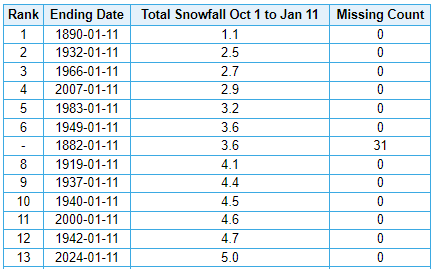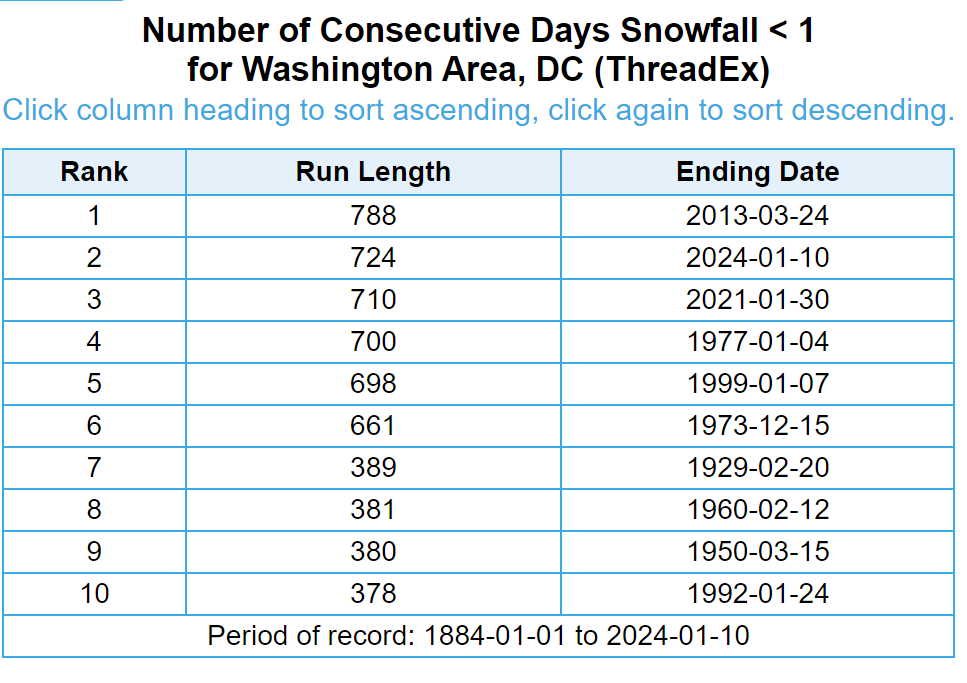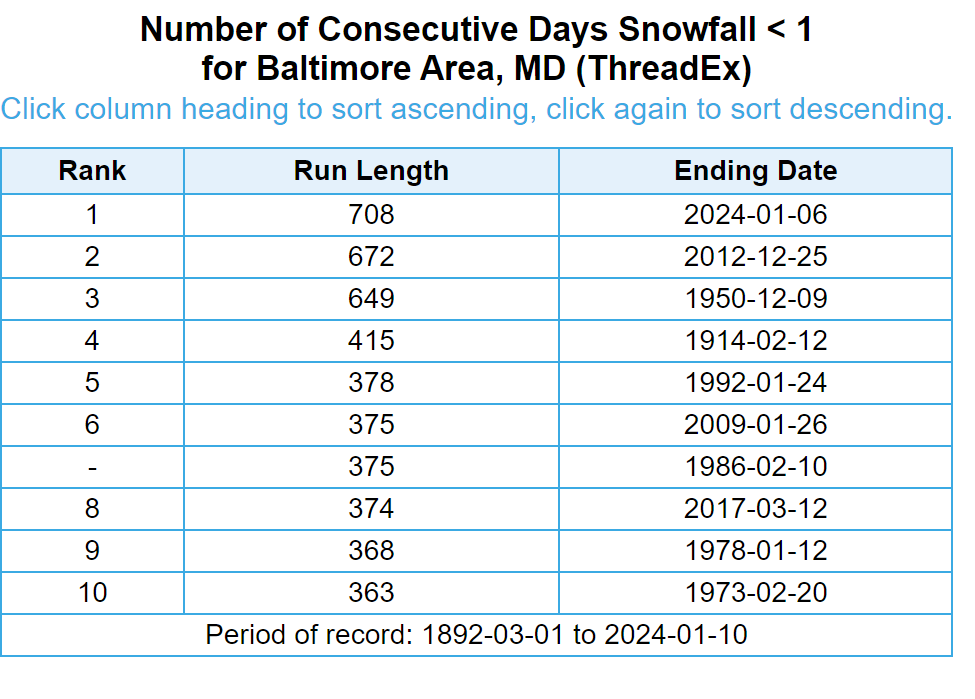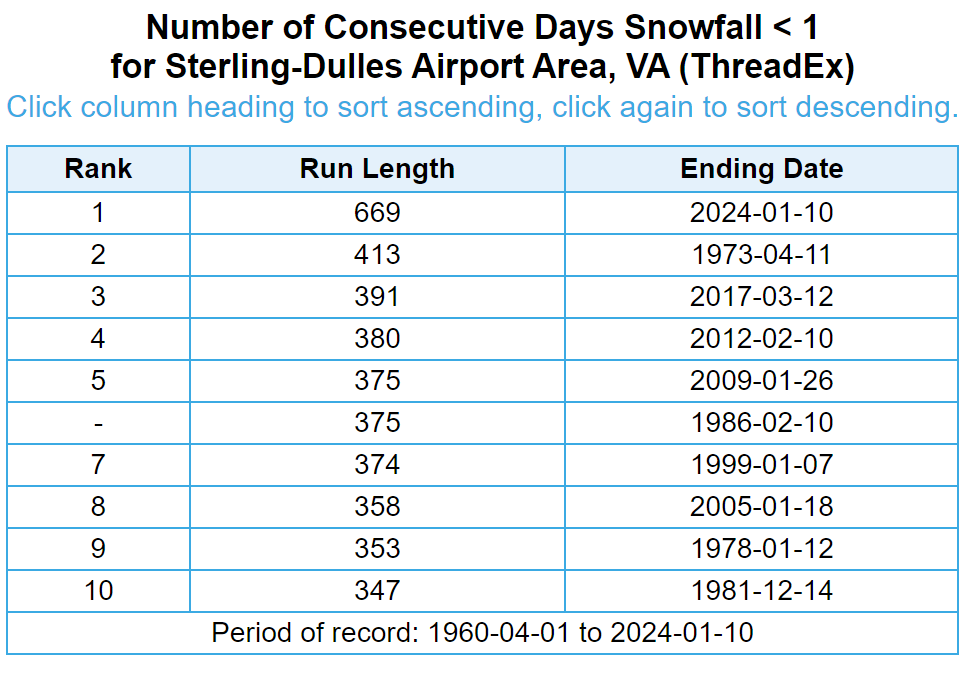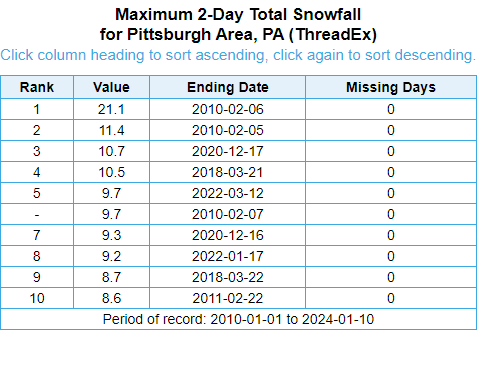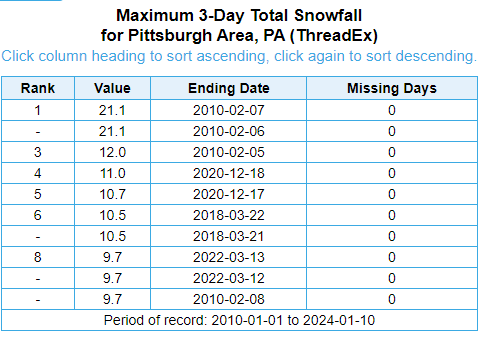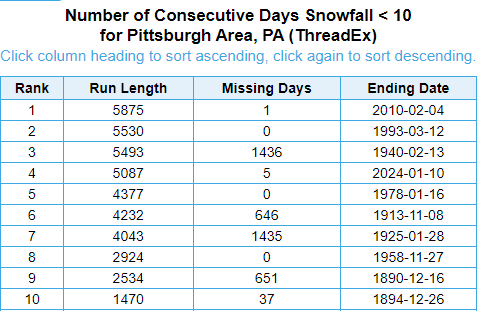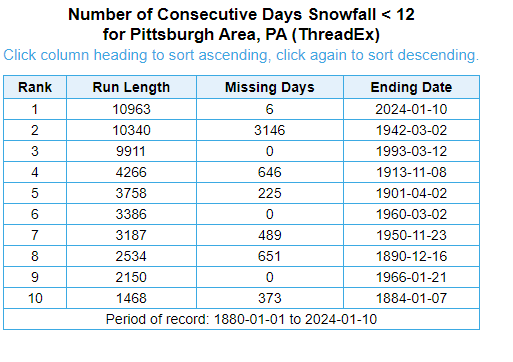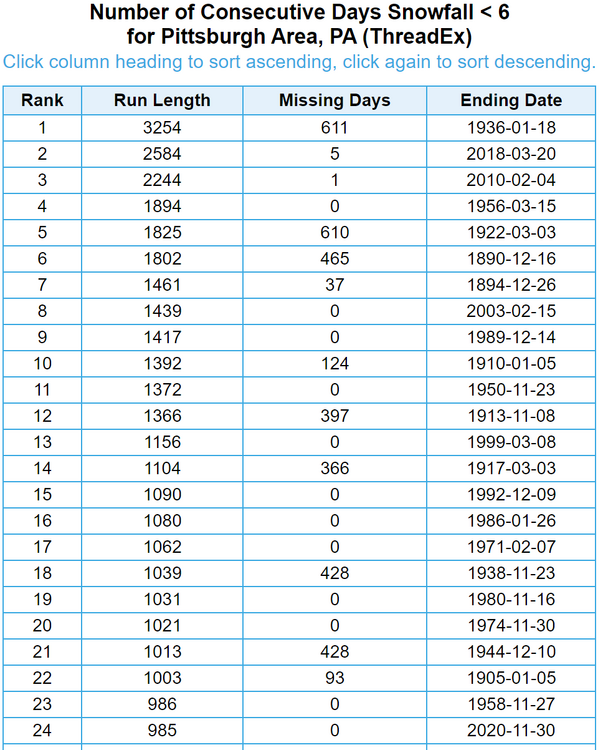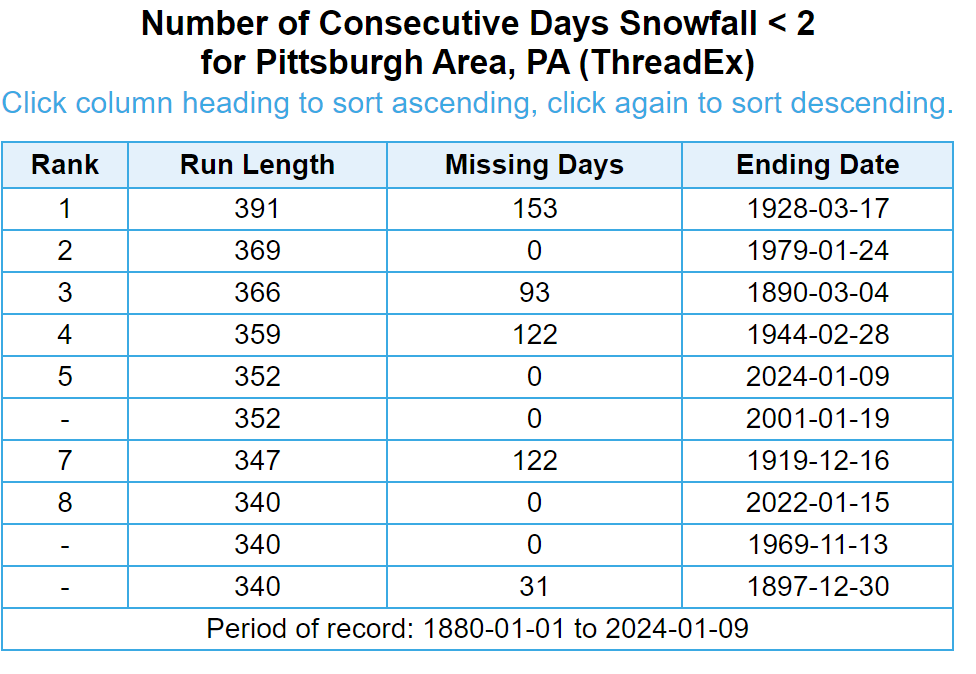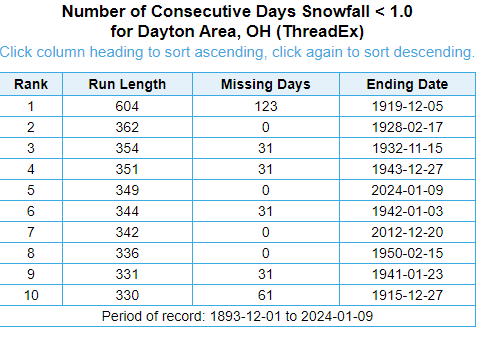
TheClimateChanger
Members-
Posts
4,325 -
Joined
-
Last visited
Content Type
Profiles
Blogs
Forums
American Weather
Media Demo
Store
Gallery
Everything posted by TheClimateChanger
-
Pittsburgh, Pa Winter 2023-24 Thread.
TheClimateChanger replied to meatwad's topic in Upstate New York/Pennsylvania
Meanwhile, Buffalo got that in just the last hour. METAR KBUF 171354Z 22008KT 1/16SM +SN VV003 M13/M14 A2989 RMK AO2 SLP137 SNINCR 3/16 P0008 T11281144 RVRNO $ -
Pittsburgh, Pa Winter 2023-24 Thread.
TheClimateChanger replied to meatwad's topic in Upstate New York/Pennsylvania
The earlier map also started at 1 am Thursday, not 1 am Friday. I think they were expecting a bit more snow on Thursday. Now it looks like a half inch at best. -
Pittsburgh, Pa Winter 2023-24 Thread.
TheClimateChanger replied to meatwad's topic in Upstate New York/Pennsylvania
-
Pittsburgh, Pa Winter 2023-24 Thread.
TheClimateChanger replied to meatwad's topic in Upstate New York/Pennsylvania
Looks like there was more snow than expected. Just eyeballing, but looks like we’re over 2, maybe about 3 inches. Falling pretty heavily too. -
January 13-17 (and beyond?) Cold Wave
TheClimateChanger replied to Geoboy645's topic in Lakes/Ohio Valley
Actually, the new scale is a bit colder for very light winds (>5 mph) and probably inflates the value to be honest. A wind of 4 or 5 mph at 10 meters is probably dead calm at ground level. It was only at winds greater 10 mph, and especially 20-30 mph, that the old scale really went off the rails. It does look like there were winds around 10-15 mph earlier in the night, with temps in the mid negative 30s, so peak wind chills on the old scale probably would have been like -80, maybe -85. Heres a good comparison: https://www.adirondackdailyenterprise.com/opinion/columns/safety-on-the-roads-by-dave-werner/2016/12/wind-chill-values-revised-in-2001/ You can see at -40 with 5 mph winds, under the old scale the chill would be -47 whereas it’s -57 under the new scale. The old was actually probably somewhat more realistic under light wind conditions. You can also see under the old scale, at -40, you would still need sustained winds of about 22 or 23 mph to reach around -100F chills. -
Winter '23-'24 Piss and Moan/Banter Thread
TheClimateChanger replied to IWXwx's topic in Lakes/Ohio Valley
I think it's also important to note that @michsnowfreakisn't being fully forthcoming with just how bad it's been. The 5.0" observed to date is the 13th lowest (of 151 years) in the threaded historical record. Also, it's reasonable to suspect that it was somewhat inflated relative to the earlier years when they didn't use snowboards and measuring at intervals throughout the storm. I believe NCAR has found as much as 15-20 percent inflation from summing 6-hourly max accumulations measured on a snowboard relative to total depth. Regardless, this is pretty bad. 5th lowest of 66 years, since official records moved to DTW. And last winter was mostly luck for Detroit that snowfall wasn't only moderately below the normal. If we take a short jog down I-75, we find Toledo had its 4th least seasonal snowfall (of 127 years). -
Winter '23-'24 Piss and Moan/Banter Thread
TheClimateChanger replied to IWXwx's topic in Lakes/Ohio Valley
Well, I'll grant you 2006-07, 2011-12 & 2015-16 were generally milder winters for much of the region. 2009-10 was very snowy for most, however. As far as questioning the validity, I'm just going by the complaints of the locals from that era. Truthfully, I didn't put much stock in their complaints since I assumed they were just denying reality. -
Winter '23-'24 Piss and Moan/Banter Thread
TheClimateChanger replied to IWXwx's topic in Lakes/Ohio Valley
If I recall correctly, there was a lot of conversation here about the quality of the observations at Toronto during that era. Most locals said it was way underdone. That was probably one of the snowiest stretches on record for the Great Lakes region, so I wouldn't place too much stock in those numbers. The 20.6" for the winter of 2009-10 is particularly suspect and out of line with surroundings. There was 48" at Pittsburgh in February 2010 alone. -
Winter '23-'24 Piss and Moan/Banter Thread
TheClimateChanger replied to IWXwx's topic in Lakes/Ohio Valley
Nonsense. Historically, some of the biggest snowstorms on record have occurred in April. The biggest snowstorm on record in Detroit occurred in April. -
If these streaks can just make it through this winter, we can really put up some impressive numbers.
-
Pittsburgh, Pa Winter 2023-24 Thread.
TheClimateChanger replied to meatwad's topic in Upstate New York/Pennsylvania
Highest 2-day total since February 2010 is 10.7 inches, on December 16-17, 2020. March 20-21, 2018 saw 10.5 inches at the airport. Highest 3-day total is 11.0 inches, from December 16-18, 2020. -
Pittsburgh, Pa Winter 2023-24 Thread.
TheClimateChanger replied to meatwad's topic in Upstate New York/Pennsylvania
Also been since February 6, 2010, since we have had 10" or better in a calendar day. The February 5-6, 2010 storm ended the longest streak of no double digit daily snowfall, or we'd really be in uncharted territory on that metric. -
Pittsburgh, Pa Winter 2023-24 Thread.
TheClimateChanger replied to meatwad's topic in Upstate New York/Pennsylvania
I guess it was just bad luck that it didn't fall during the 2010 storm. Straddled two days. -
Pittsburgh, Pa Winter 2023-24 Thread.
TheClimateChanger replied to meatwad's topic in Upstate New York/Pennsylvania
We are so overdo for a 12"+ calendar day, it's not even funny. I'm not sure this streak will ever end. Might be permanent. -
Pittsburgh, Pa Winter 2023-24 Thread.
TheClimateChanger replied to meatwad's topic in Upstate New York/Pennsylvania
Currently, it's been 668 days since a 6"+ calendar day snowfall at PIT, which is only 35th longest. Of course, if we don't see any 6" calendar days this winter, we will quickly climb the ranks. As an aside, it's also been that long since 3" has been observed in a calendar day [good for 4th longest streak]. The last 3" or better calendar day being 3/12/2022, when 8.0" was observed - part of a 2-day total of 9.7". -
Pittsburgh, Pa Winter 2023-24 Thread.
TheClimateChanger replied to meatwad's topic in Upstate New York/Pennsylvania
6-inch calendar day snowfalls have been atrocious lately. There was a 2,584 day gap that ended with a fluke 8.7" on March 21, 2018 [2-day total of 10.5"], which was promptly followed by another 985-day gap which ended with 6.8" on December 1, 2020. If not for that fluke storm [which had a lot of uncertainty, and was expected to be under 6"], we would have shattered #1 there. -
Pittsburgh, Pa Winter 2023-24 Thread.
TheClimateChanger replied to meatwad's topic in Upstate New York/Pennsylvania
-
Winter 2023/24 Medium/Long Range Discussion
TheClimateChanger replied to Chicago Storm's topic in Lakes/Ohio Valley
Yeah, I just confirmed that 1918-1919 is the only winter without a calendar day snowfall of 1" or greater at DAY. The maximum was 0.6" on a couple of occasions. Of course, this was when observations were still downtown, which is a couple/few hundred feet lower in elevation than the more suburban airport site. Also, snow measuring techniques were different than today [no snowboard/clearing]. Regardless, a top 4 streak looks to be a near certainty. -
Winter 2023/24 Medium/Long Range Discussion
TheClimateChanger replied to Chicago Storm's topic in Lakes/Ohio Valley
Interesting. 5th longest streak on record, and longest since the official records have been taken at DAY airport (see below). Looks like it should move into 4th place for sure, maybe third. It would probably be difficult to get another two weeks without 1"+ snowfall on a calendar day to move into second place with the current pattern. Some missing data for the early years, especially the #1 streak, so it might be inflated. But I think that's just some summer months where snowfall wasn't reported and the algorithm interprets that as missing data - but there could be some missing winter data in there as well. -
Pittsburgh, Pa Winter 2023-24 Thread.
TheClimateChanger replied to meatwad's topic in Upstate New York/Pennsylvania
1.29” of precipitation reported on my weather station so far today. -
Central PA Winter 23/24
TheClimateChanger replied to Voyager's topic in Upstate New York/Pennsylvania
Looks like some of the worst winds are in Westmoreland County. Latrobe (Arnold Palmer Airport) is reporting wind gusts to 68 mph: National Weather Service : Observed Weather for past 3 Days : Arnold Palmer Regional Airport -
Let’s talk winter!! Ohio and surrounding states!!
TheClimateChanger replied to Steve's topic in Lakes/Ohio Valley
I just hope southeast Michigan gets missed. After cheating their way to a natty, they don't deserve any snowfall this winter. -
1/8-1/10 Potential Winter Storm
TheClimateChanger replied to Thundersnow12's topic in Lakes/Ohio Valley
Weird how Midway has had more than Rockford. Doesn't seem possible.


